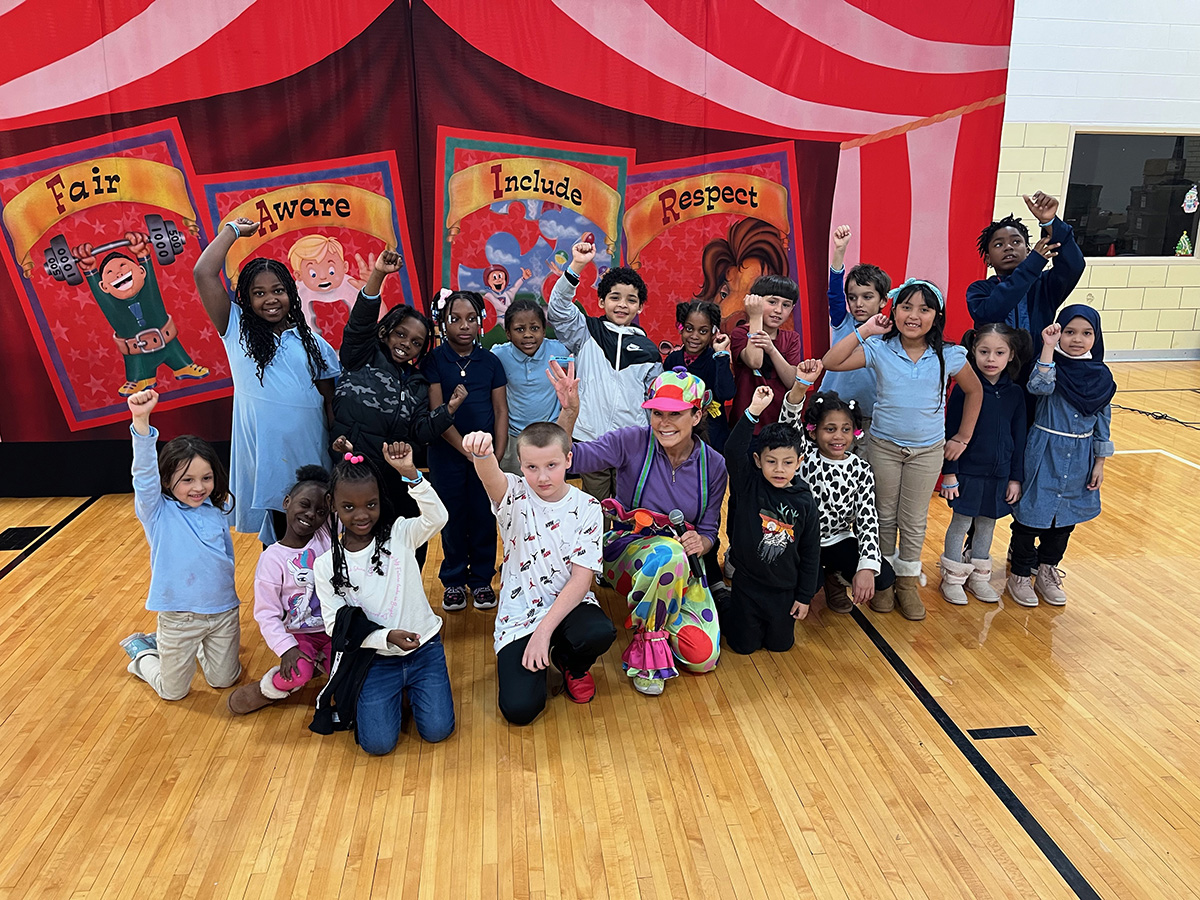
On Facebook, there is a group called School Show Performers with over 500 full-time and part-time school show presenters sharing ideas, tips, and advice on performing, as well as stories from the road.
Recently, the topic of school performance effectiveness came up, with about a dozen presenters weighing in. This thread is pasted below, starting with the original post, followed by the comments.
If your PTA, PTO or principal questions the value of an assembly show, the comments below may be helpful in making decisions about hosting an assembly at your school.
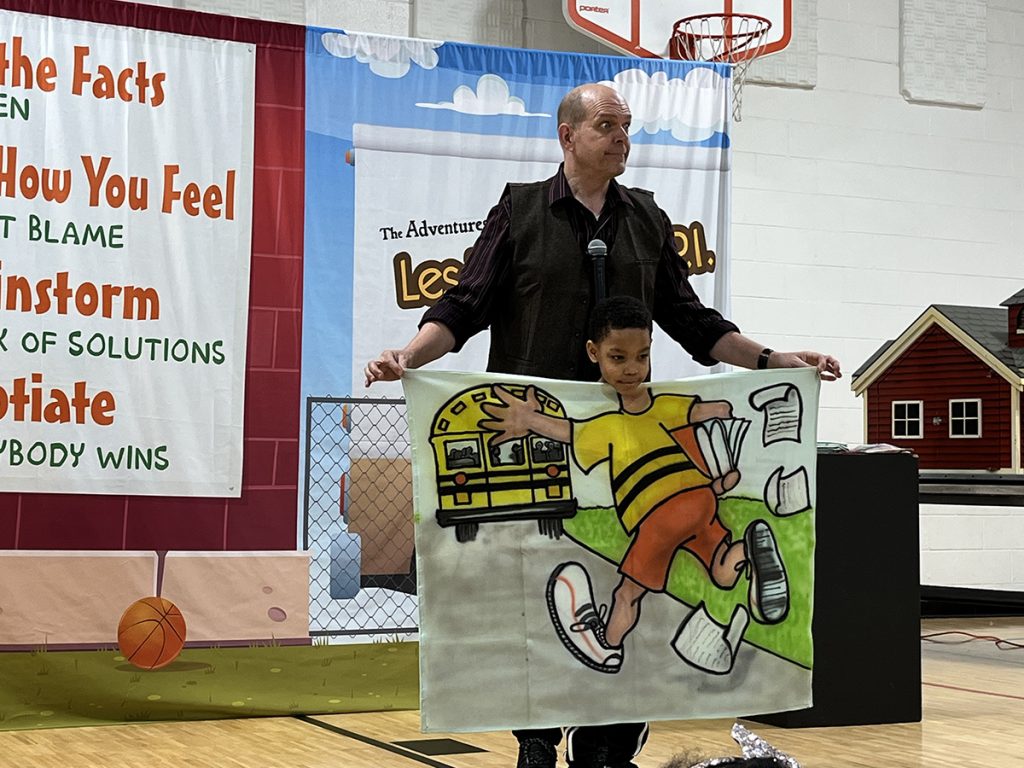
I do not want to be pessimistic. But this Facebook group can talk openly, and I think that’s good. My brother told me about motivational speakers who came to his company on a Friday afternoon and again on Friday night for an awards banquet. He said it was great! He was thrilled!!! But on Monday, it was back to the daily grind, and the weekend took all the thrill out of it for him. Is this what happens after our assembly shows? Sure, when the kids go home, their faces are smiling, they’re hugging me and rooting for me. But did they really get the message? Are they better because they saw my assembly show at their elementary school?
Of course, a lot depends on the teachers. Do they follow up? Do they have classroom discussions? Do they take even 30 seconds to look at the teacher’s guide we sent?
We all go to the elementary schools with the best intentions, work hard on our assembly presentations, and present an exciting and fantastic program…but is any of that important to the core of the message we deliver?
Or maybe we’re just there to break up the week. We add to the fun element of school and life. We do teach that there is a right (and wrong) way to be an audience member. And that is a life skill; being able to show respect to the performer and other audience members is crucial to the success of an assembly presentation. We present a theatrical experience and social norms need to be followed to insure success. Theater is not a sporting event where spectators yell, chant and curse the refs. Kids need to learn that. We all teach that too.
What inspired me to think about this is a show I gave this past week. I know that not one adult in my audience that day would describe my show as ‘inspiring’. They were barely paying attention. No one in the office seemed competent (they forgot I was coming even after my follow up reminder and a phone call the day before), none of the teachers seemed engaged, the principal was very happy to delegate her introductory duties to a school kid, and not a second of the assembly to be seen. This is rare but when it does happen, I know I have my work cut out for me that day.
I did my thing, the kids loved it, but by lunch I can only imagine that they were back in the same rut. But rest assured, though that I am in a good and happy place. I made children laugh and giggle. Maybe that’s all they needed that day. Maybe the message was secondary. Do they remember any of my message, though? I like to think they do, but for how long? Like all of you, I take great pride in my work. I have a gift to share but sometimes having it accepted fully is difficult.
What do you think? I look forward to hearing of your experiences.
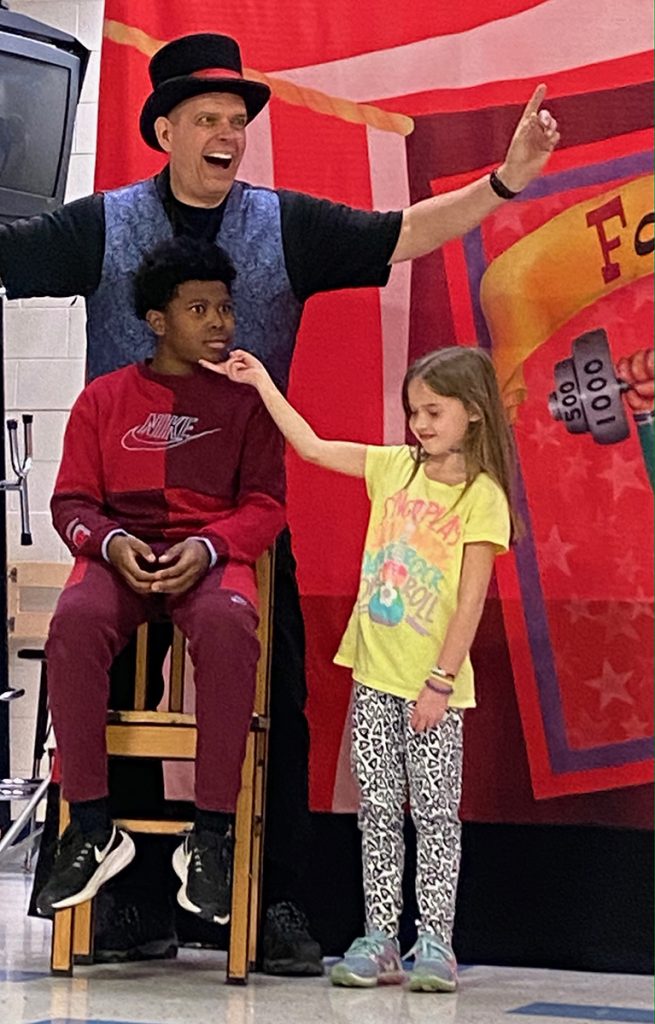
Many presentations focus on inspiration and motivation, verses transformation.
Those that make a lasting difference in the education market focus on teaching transformative skills.
Schools pay for transformative education that delivers lasting results. This is why education companies tend to make higher profits than entertainers.
My friends who are magicians are shocked that my school clients don’t know I’m a magician before the show starts. Telling them would be a distraction. They hire me because my message has been proven to reduce aggression on campus and increase student resilience. They’re looking for an expert their students will actually listen to. Magic, audience participation, and comedy are 3 ways I connect, but not the reason they hire me.
A few questions presenters need to consider:
I think it depends on the topic of the show. Do I think a troubled kid from a broken home will think about all the things he’s done to others after my show and stop being a bully … probably not on his own.
However, with shows like my themed reading programs, I think they encourage kids to read. When I perform at libraries, many kids take books about sharks, turtles, or the particular topic of my show, so I think they will go home and learn more about the topics covered in the show. I’ve received messages from parents and teachers telling me that the kids come back to my show later in the year when they’ve learned something, so it makes a difference. I would say the same thing about “Wacky Science,” one of Doug Scheer’s shows that I put on in my area. I think it inspires some of the kids in the audience to go home and either talk about it or even try some of the experiments from the show.
I always say that if I made a kid who was having a bad day smile, laugh or feel better, that’s more important than any of the messages in my show. So I feel like we’re making a difference, and we’re giving teachers the opportunity to spend 45 minutes of stress relief or a chance to sit on the sidelines and catch up on grading papers.
I think it also has to do with school culture. Almost every school I visit these days has posters about respect and kindness and so forth. But the behavior of the students is the real litmus test. The other day I went to two schools in the same city. In the first school, the kids were excited, and when I told them to calm down, they did so almost immediately. Overall, it was the best show I’ve ever had.
The second school that day, same city, same grade levels. Same motivational posters hanging everywhere.
But these kids were loud, wild, and only quieted down but only after several minutes into the show.
So I think what we accomplish in the long run is largely out of our hands. We can give them something that has the potential to take root and flourish. But if the teachers and the culture of the school are not helping to foster that kind of growth, there’s not much we can do about it. We’ve done our part. In my unscientific opinion, the principal sets the tone in the school. It comes down to leadership and what the principal allows and does not tolerate.
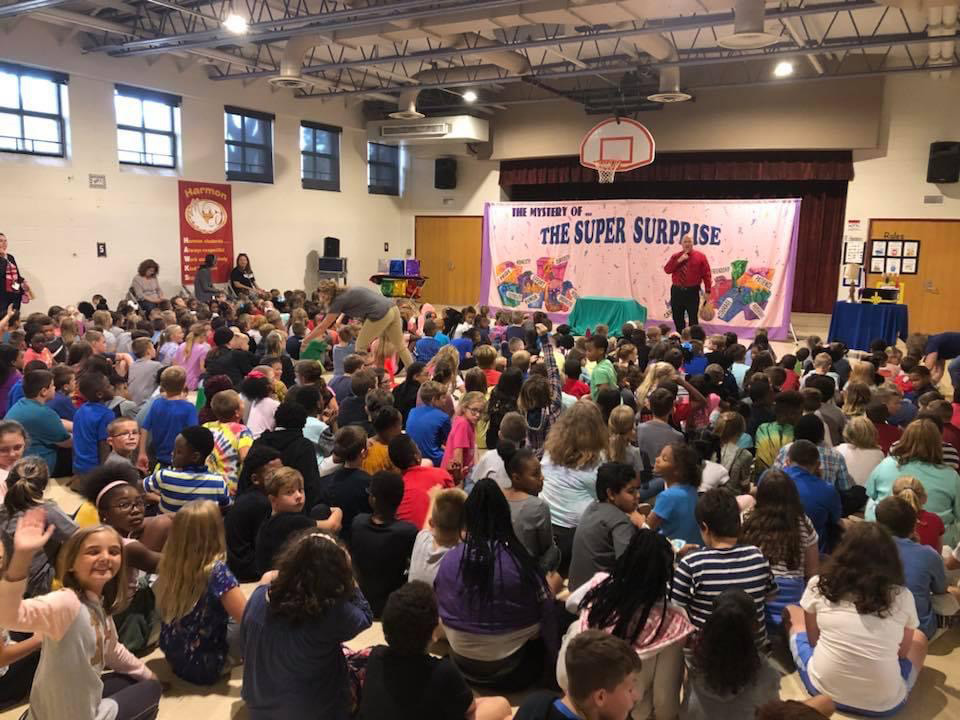
I agree wholeheartedly! I can almost predict what kind of audience I will have within 20 minutes of entering the school. Do I see teachers yelling at kids or addressing them with respect? That makes a huge difference. I have been an assembly show performer for 30 years now, and I’ve meet teachers who remember me coming to their school when they were little. I am very impressed by that. Kids remember things that are not commonplace. I know we are making a difference.
Part of why I love doing shows for kids is because I have strong memories of the performances from my elementary school growing up. I remember very little from before I was ten; I’ve blocked out the grief I experienced daily at home, but I vividly remember the shows from my elementary school. The Wolfe Brothers singing about the revolutionary war, a magician who did a recycling show, an author who came and read from her book and told us that one day we too could be authors…the list goes on. I do not think it changed my daily life much, but they were fond memories that I cherish. I think school artists play an important role for kids!
I’m fortunate to be a longtime performer in a core area. It was very flattering to be approached by parents at local restaurants after their child had taken notice of me and to hear that I had really piqued their children’s interest in animals and biology. I also performed at local fairs and libraries for longer periods of time, so I had more time to talk to parents between performances and I learned from them that I made a strong initial impression. Will that turn into a lasting impression on all of the children? No. Of course not. But, You never know when you’ll leave a memory or an impression on someone. We need to keep doing what we’re are doing. You may even get a comment like the one I got from a 92 year old man who had seen my shows for almost two decades at local fairs. He said, “I always enjoy your shows, but when did you get old?” I almost kicked the cane out from under him. LOL
I cannot tell you if we really make a difference, but when I was in fifth grade, a local weatherman came to our school. I remembered him when I saw him years later at an event he was visiting because he has since become a political figure. I am 54 years old and remember him taking the time to visit us when I was 11 years old. Decide for yourself if a visit to a school means anything. I still remember him explaining storm fronts, how tornadoes form, and how high and low pressure affect the weather.
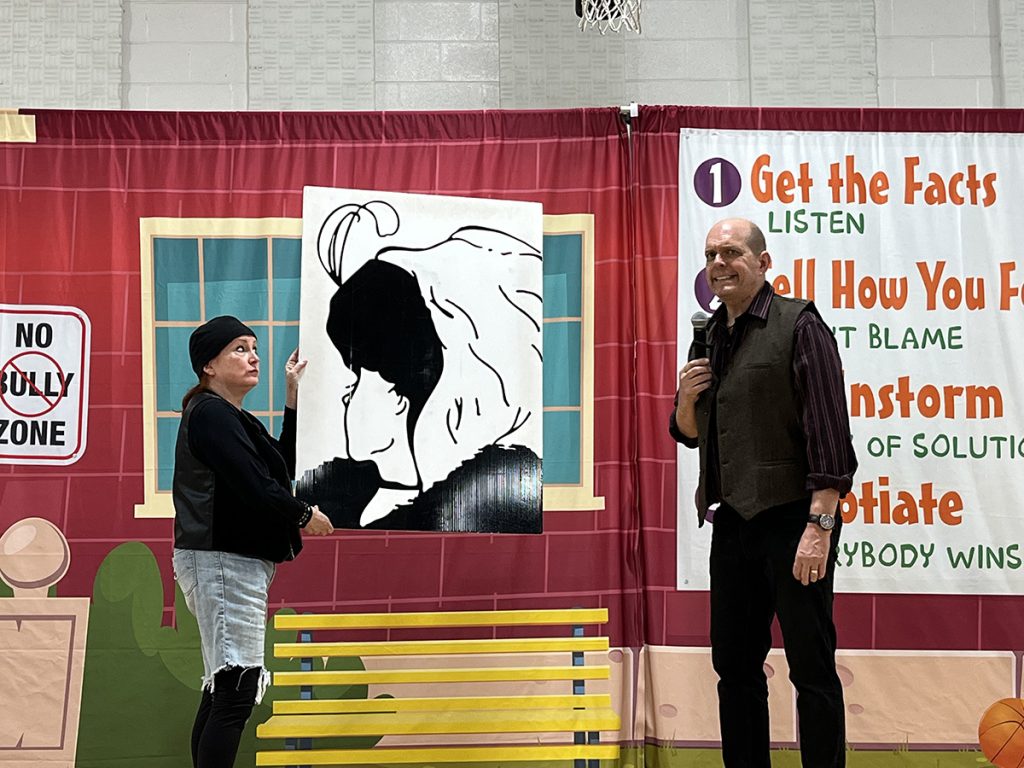
A one time assembly show is like kids reading a book on a subject. Or watching a movie. Or having a worksheet. It works because it’s cumulative.
Does my math show make kids better at math? No. But it does reinforce the classroom lessons and maybe it encourages one or two to try some of the topological tricks, sparking further exploration.
Maybe my Wacky Science show will encourage a kid to melt styrofoam with acetone or visit the library for a science book.
I remember the magician I saw in kindergarten. He motivated me. I hope that I might motivate a future engineer, scientist, author, or even magician.
The breeze of a butterfly’s wing…
If your message resonates with the right kid, even if it’s just a kid. Then you have done something amazing. Not everyone will be receptive.
We only need to inspire one child to change the world.
This related story sums it all up nicely: Starfish story
Think about it: A woman is born with all the eggs she will ever have. And while the genetics are fixed, the expression of those genetics is not, and the way those genes are expressed is influenced by trauma and other experiences as she grows up. So if you make someone happy, you can counteract trauma and literally influence the genetic expression for two or three generations. Making someone happy, even for a short time, is never wasted effort.
Assemblies themselves are instructive. One learns to participate as a listener, to respond appropriately, to applaud, and to listen. One problem is that sometimes teachers and administrators are often poor examples of these lessons. When staff act uninvolved, I know I’m not really there to make a lasting impression, but to provide variety. And that’s fine, too. Everyone needs a little escapism now and then. Our assembly shows can provide relaxation and stress relief for students and teachers.
I hope you found value in these comments. When your school is ready to book an assembly show for your students, please explore the 12 shows I offer: